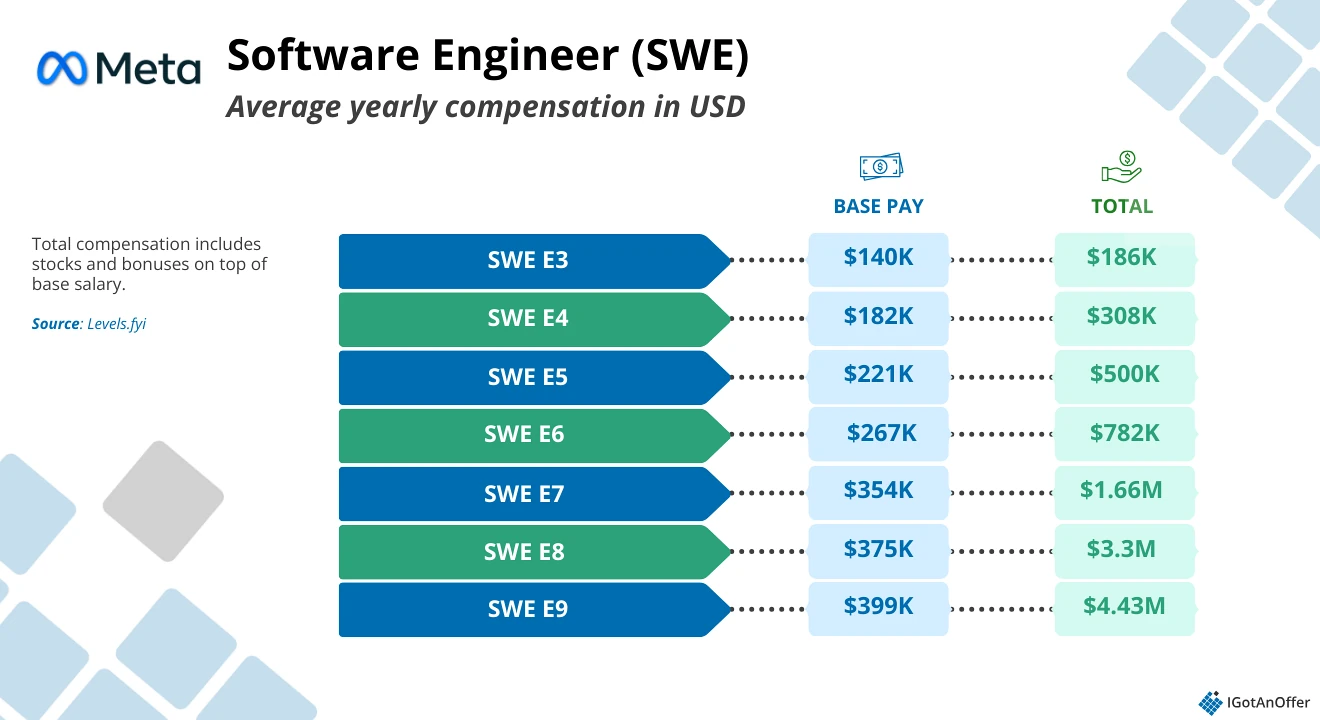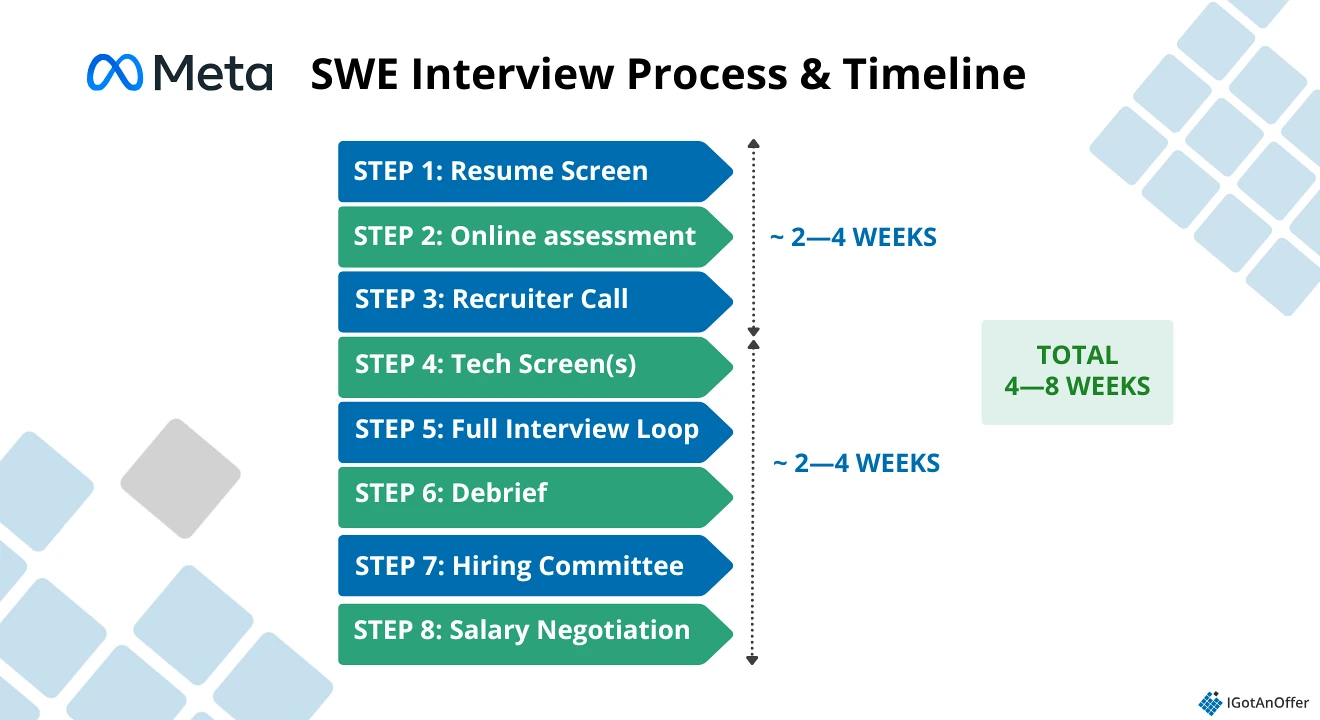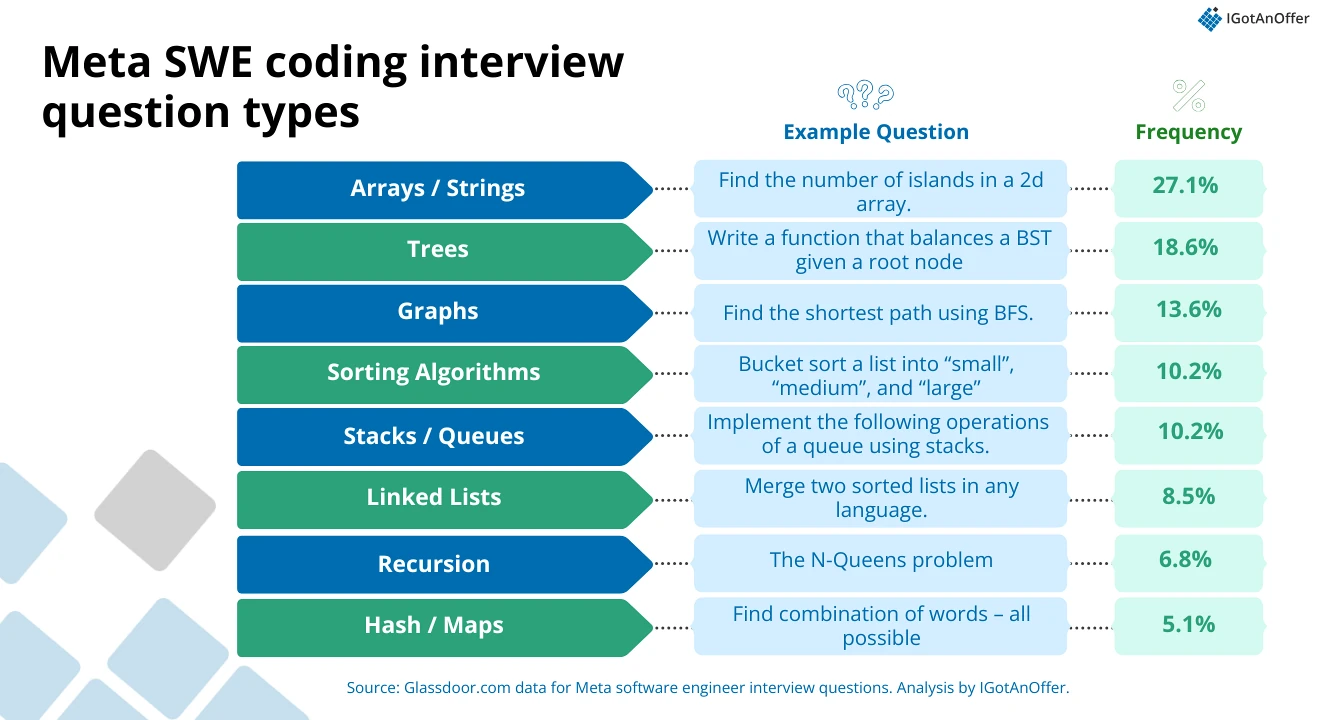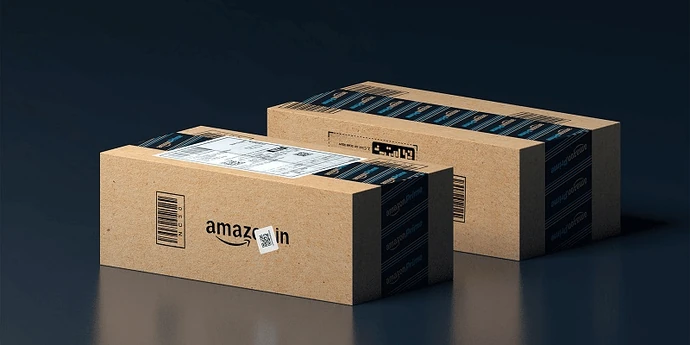Acing Meta software engineer interviews is all about showing you can build real things quickly and accurately. To land the job, you need to be great at coding, smart about designing systems, and a good fit for Meta’s unique culture. The questions are tough, but they’re not impossible if you understand what the interviewers are looking for.
This guide breaks down the process and gives you a clear roadmap to prepare for every stage of the interview process.
PLUS: We’ll be discussing the new AI-enabled coding round, which is quite different from the usual coding rounds but just as important to get right.
Let’s get into the specific steps you need to take to succeed. Here’s an overview of what we’ll cover:
Note: Check out our engineering manager interview guide if you’re targeting a management role. We also have specific guides for the roles of data engineer, front-end engineer, machine learning engineer, and production engineer.
Click here to practice 1-on-1 with ex-Meta SWE interviewers
1. Meta Software Engineer Role and Salary↑
Before we dive into the interview process and questions, let’s quickly cover some basics about the role you’re applying for.
1.1 What does a Meta Software Engineer do?
Software engineers within Meta have varying functions and roles that revolve around coding, creating, innovating, and solving problems.
As a Meta software engineer, you’ll be involved in developing and maintaining the company’s array of products and platforms, which include Facebook, Instagram, WhatsApp, Meta Quest, and more.
Additionally, depending on your level, you’re expected to specialize in constructing, analyzing, and enhancing the scalability, efficiency, and stability of Meta’s various systems.
Pranav (ex-Meta engineering manager) says, "Meta is an engineering-driven company and engineers make most of the technical decisions." These decisions often need to be made relatively quickly. The "move fast, break stuff" motto still holds to a large extent, and engineers should be able to adjust to changing circumstances and priorities swiftly.
Another thing that makes Meta unique is its bottom-up culture, says Tom. "There is an expectation that you will have a strong level of autonomy, ownership, and dealing with ambiguity."
If you want to learn more about the different SWE levels at Meta, check out our guides below:
1.2 Meta Software Engineer salary and compensation
Meta's competitive salary is among the numerous factors that draw software engineers to the company.
Below are the average salaries and compensations for the different software engineer levels at Meta, based on Levels.fyi reported data.

Meta software engineers generally have a high base salary and compensation. According to Glassdoor, the average salary of Meta SWEs is 57% higher than the average salary of other software engineers in the US.
The average salary of Meta Software Engineers varies depending on location or region. For example, a Meta SWE E6 in the US has a much higher annual salary than a Meta SWE E6 in India.
While we presume that you know which specific SWE level you are applying for, it’s still best to double-check with your recruiter. They should be able to advise you on which level you’re being evaluated.
Ultimately, your interview performance will largely determine your offer, which is why working with one of our ex-Meta interview coaches can be a smart investment.
And remember, Meta compensation is negotiable. If you get an offer, don’t hesitate to ask for more. For tips, read our Meta salary negotiation guide. If you need further help and practice negotiating, our salary negotiation coaches can help you maximize your package with expert guidance.
2. Meta Software Engineer Interview Process and Timeline↑
The good news is that Meta is great at sharing how its interviews work, so there's not much mystery. That doesn't mean it's going to be easy, though!
Please note that the process outlined below is for E3 and E4 level candidates. If you're interviewing for a more senior individual contributor role, it might change slightly. Check out our guides to Meta E5 interviews and Meta E6 interviews for more details.
2.1 Steps to expect
What's the Meta interview process and timeline for the software engineer role? It takes four to eight weeks on average and follows these steps:

- Resume and referrals
- Online assessment (in some cases)
- Recruiter phone screen: one interview
- Technical phone screen: one or two interviews
- Full interview loop: four or five interviews
Let's look at each of these steps in more detail below:
2.1.1 Resume, cover letter, and referrals
First, recruiters will look at your resume and assess if your experience matches the open position. This is the most competitive step in the process—we’ve found that ~90% of candidates don’t make it past this stage.
For real resume examples and tips on tailoring your resume to the company and position, see our Meta resume guide, SWE resume guide, and senior SWE resume guide.
Or, get expert feedback from our team of ex-FAANG recruiters, who will cover what achievements to focus on (or ignore), how to fine-tune your bullet points, and more.
2.1.2 Online assessment
After submitting an application, you might get an online assessment. A few candidates on Glassdoor report getting one as part of or before their recruiter screen.
According to this Reddit post, it’s a 90-minute proctored round, requiring you to keep your video and mic on. You’ll get a base problem with 4 stages, and you’ll need to pass each stage to proceed to the next.
2.1.3 Recruiter phone screen
If you don’t get an online assessment, you’ll likely start with an HR phone screen. They are looking to confirm that you've got a chance of getting the job at all, so be prepared to explain your background and why you’re a good fit at Meta.
You should expect typical behavioral and resume questions like, "Tell me about yourself", "Why Meta", or "Tell me about your current day-to-day as a developer."
One great thing about Meta is that they are very transparent about their recruiting process. Expect your recruiter to walk you through the remaining steps in the hiring process and share with you a helpful email listing resources you can use to prepare.
At this stage, don’t forget to create a Metacareers account. This will serve as a hub for your entire application process.
2.1.4 Technical phone screen
If you get past the first HR screen, the recruiter will then help schedule your first technical screens with a Meta engineer.
For this step, you might get one or two 45-minute sessions. These usually happen over the phone, starting with a few behavioral questions, but most of the time will be spent on coding questions (typically Meta-tagged LeetCode easy to medium).
You'll use a simple online code editor without syntax highlighting or auto-completion for these phone interviews (e.g., CoderPad), so it's a good idea to practice using one of them beforehand.
We cover this stage in more detail in our Meta phone screen interview guide.
You can also take a look at Meta’s tech screen guide for official information.
2.1.5 Full interview loop
Full loop interviews are the real test. You'll typically spend a full day either virtually or at a Meta office and do four or five interviews in total.
Each interview will last about 40 to 60 minutes. Expect three different question types: coding, system design/product design, and behavioral/’getting to know you questions.
- 1-2 x standard coding interviews, where you'll solve general coding questions which will typically be harder than in the initial technical screen
- 1 x AI-enabled coding interview, where you’ll work through one multi-part problem with the optional use of AI assistance on CoderPad
- 1 or 2 x design interviews, where, depending on your background, you'll be asked a system or product design question
- 1 behavioral/’getting to know you’ interview, where you can expect to discuss your past experiences and your motivation to work at Meta.
One crucial update to the full interview loop is the use of AI assistance during one of the coding interviews. Here’s what Meta says about this update on their FAQ:
Meta is piloting a new, AI-enabled SWE coding interview to reflect the evolving role of software engineers and where we’re headed in the future. Candidates in the pilot groups will now have the option to use authorized AI tools within CoderPad during one of their coding interviews. The pilot will include one “classic” coding interview and one AI-enabled interview. Interview questions, focus areas, and evaluation criteria are also being enhanced to better reflect the current coding skills required at Meta, such as debugging and code review.
According to John (Meta engineering manager), the AI-enabled coding round lasts for 60 minutes. You’ll be given one thematic question with multiple stages.
"Using it is optional, and you are not evaluated on how often you use it. What matters is your ability to think critically, understand the code, and make informed decisions," he says.
If you do use AI-generated suggestions, be ready to explain:
-
Why the code works,
-
What trade-offs were made,
-
And, how it fits into the larger system.
The AI-enabled coding round is still in its pilot stage, but many candidates have reported getting it in the last few months. We’ll cover it in greater detail in section 3.
Most interviews post-COVID-19 have been conducted virtually, but in-person interviews still happen. Your recruiter will inform you about your interview venue, so no need to worry about it.
If you’ve been invited to interview in person, you might also get a lunch schedule with a fellow engineer. It’s meant to be your time to ask questions about what it's like to work at Meta. The company won't be evaluating you during this time, but we recommend that you behave as if they were.
Check out Meta’s full interview loop guide for official information.
2.2 Differences between levels and roles
2.2.1 Junior vs senior software engineers
There are significant differences between junior and senior SWE candidates at Meta. Here’s a quick comparison of their responsibilities and interview expectations.
Meta SWE E4 (mid-level)
Core responsibilities
- Project ownership
- Cross-team collaboration
- Proactive contribution
- Code quality reviews and mentoring
Interview expectations
You’ll be expected to do extremely well in your coding interviews, but for system design interviews, you’re only expected to cover the basics.
Learn more about the Meta E4 interview here.
Meta SWE E5 (senior level)
Core responsibilities
- Problem space (end-to-end) ownership
- Cross-functional collaboration
- Mentorship of junior engineers (E3 and E4)
- Close collaboration and support for staff engineers
- Org-wide initiative participation
- Streamlining developer experience and operational excellence initiatives
Interview expectations
You’ll be expected to do extremely well in your coding interviews. For system design, you might get more than 1 session, where you’ll be expected to dive deeper into operational concerns, scalability, and trade-offs.
Learn more about the Meta E5 interview here.
Meta SWE E6 (staff level)
Core responsibilities
- Ownership of projects with industry-wide impact
- Mentoring/influencing senior engineers across organizations
- Planning multi-year roadmaps
- Driving large cross-functional/industry-wide engineering efforts
Interview expectations
Meta E6 engineers won’t be expected to code, but are still expected to demonstrate expert coding ability. For design interviews, you’ll be required to tackle a complete high-level system, including measurable metrics, realistic requirements, and fully explained and interconnected components.
Learn more about the Meta E6 interview here.
2.2.2 Individual contributors vs managers
Meta has two SWE career tracks:
- Management track, where you end up leading teams of engineers
- Individual contributor (IC) track, where you stay very hands-on technically and specialize as you become more senior
If you're interviewing as an individual contributor, then you should expect mainly technical interviews and a single behavioral interview.
If you're interviewing for a manager level or above, then you may face more than one behavioral interview. Be prepared to answer questions about how you develop people, work with cross-functional teams, execute projects, grow an organization, etc.
2.3 What happens behind the scenes
Your recruiter is leading the process and taking you from one stage to the next. Here's what happens behind the scenes at each of the stages described above:
- After the Technical Phone Screen, your interviewers have 24 hours to submit their ratings and notes to the internal system. Your recruiter then reviews the feedback and decides to move you to the full loop interview or not, depending on your performance.
- After the Full Loop, the interviewers will make a recommendation on hiring you or not. The recruiter compiles your "packet" (interview feedback, resume, referrals, etc.) If they think you can get the job, they will present your case at the next candidate review meeting.
- At candidate review meetings, your packet will be assessed and analyzed, and possible concerns will be discussed. Your interviewers are invited to join, but will usually only attend if there's a strong disagreement in your grades (e.g., 2 no-hires, 2 hires). At the end of the candidate review meeting, a hire / no-hire recommendation is made for consideration by the hiring committee. If, after discussions, the team still can't agree whether you should get an offer or not, you might be asked to do a follow-up interview.
- The hiring committee includes senior leaders from across Meta. They usually follow the recommendation of the candidate review meeting, so their review is more of a formality. Their main focus is on fine-tuning the exact level and compensation you will be offered.
During the hiring committee stage, you will get into the team matching phase. This is where you’ll speak with hiring managers to assess mutual fit based on your interests and their team’s needs. Learn more about the Meta team matching process here.
It's important to note that hiring managers and people who refer you have little influence on the overall process. They can help you get an interview at the beginning, but that's about it.
3. Meta Software Engineer Example Questions↑
Okay, now that we've covered the interview process, let's dig into the three types of interviews that you'll encounter:
Below, we've put together a summarized list of example questions for each of these interview types, based on reports from Glassdoor. We've also provided a few notes about them, which should help you get a better idea of what to expect. Let's jump in!
3.1 Coding interview questions↑
Meta software engineers solve some of the most difficult problems the company faces with code. It's therefore essential that they have strong problem-solving skills.
Expect to face coding problems during your tech screens and two or more coding interviews at Meta during the full loop. Each coding interview may require you to solve at least 2 problems.
According to Thang (ex-Meta data engineer), you’ll typically get medium to difficult coding problems during your Meta coding interviews. Many of the Meta SWE candidate reports on Glassdoor confirm this. The difficulty level goes up as you advance in the interview process.
Based on our analysis of the 50 most recent coding questions reported on Glassdoor, here’s how frequently each topic gets asked:

You might fail to finish a coding problem (due to time constraints) and still get an offer in the end. Your focus, according to Luis (ex-Meta software engineering manager), should be on how you communicate your ideas and establish rapport: “Make sure you’re not trying to 'boil the ocean' or trying to impress your interviewer by trying to solve the problem in isolation.”
Let’s take a look at some example questions below.
Example Meta SWE coding interview questions
Arrays & strings
- Longest repeating substring with replacement (Solution)
- Find the number of islands in a 2d array. (Solution)
- Given a string of an arithmetic expression, composed of numbers, '+' and '*', calculate the result. (Solution)
- Given an array nums of n integers where n > 1, return an array output such that output[i] is equal to the product of all the elements of nums except nums[i]. (Solution)
- Given a non-empty string s, you may delete at most one character. Judge whether you can make it a palindrome. (Solution)
- Implement next permutation, which rearranges numbers into the lexicographically next greater permutation of numbers. (Solution)
- Given a string S and a string T, find the minimum window in S which will contain all the characters in T in complexity O(n). (Solution)
- Given an array of strings strs, group the anagrams together. (Solution)
- Given a string s containing just the characters '(', ')', '{', '}', '[' and ']', determine if the input string is valid. (Solution)
- Given an array nums of n integers, are there elements a, b, c in nums such that a + b + c = 0? Find all unique triplets in the array which give a sum of zero. (Solution)
Check out our list of array interview questions and string interview questions for more samples with solutions.
Trees
- Find the lowest common ancestor in a binary search tree (Solution)
- Write a function that balances a BST given a root node. (Solution)
- Flip a binary tree (Solution)
- Given the root node of a binary search tree, return the sum of values of all nodes with value between L and R (inclusive). (Solution)
- Given a Binary Tree, convert it to a Circular Doubly Linked List (In-Place). (Solution)
- Implement an iterator over a binary search tree (BST). Your iterator will be initialized with the root node of a BST. (Solution)
- Given a binary tree, you need to compute the length of the diameter of the tree. (Solution)
- Serialize and deserialize a binary tree. (Solution)
- Given a binary tree, find the maximum path sum. (Solution)
- Given a sorted dictionary (array of words) of an alien language, find order of characters in the language. (Solution)
Check out our list of tree interview questions for more samples with solutions.
Graphs (DFS & BFS)
Check out our list of graph interview questions for more samples with solutions.
Sorting algorithms
- Merge three sorted integer arrays (Solution)
- Bucket sort a list into “small”, “medium”, and “large” (Solution)
- We have a list of points on the plane. Find the K closest points to the origin (0, 0). (Solution)
- Given two arrays, write a function to compute their intersection. (Solution)
- Given an array of meeting time intervals consisting of start and end times [[s1,e1],[s2,e2],...], find the minimum number of conference rooms required. (Solution)
Check out our list of sorting interview questions for more samples with solutions.
Stacks & queues
- Basic Calculator IV: Given an expression such as expression = "e + 8 - a + 5" and an evaluation map such as {"e": 1} (given in terms of evalvars = ["e"] and evalints = [1]), return a list of tokens representing the simplified expression, such as ["-1*a","14"] (Solution)
- Find the matching brackets to balance the open and closed brackets (Solution)
- Implement the following operations of a queue using stacks. (Solution)
Check out our list of stack interview questions and queue interview questions for more samples with solutions.
Linked lists
- Merge two sorted lists in any language. (Solution)
- Reverse linked list at the kth position. (Solution)
- A linked list is given such that each node contains an additional random pointer which could point to any node in the list or null. Return a deep copy of the list. (Solution)
- Given a singly linked list L: L0?L1?…?Ln-1?Ln, reorder it to: L0?Ln?L1?Ln-1?L2?Ln-2?… (Solution)
Check out our list of linked list interview questions for more samples with solutions.
Recursion
Hash & maps
Check out our list of map interview questions for more samples with solutions.
To learn more, read our guide to Meta coding interviews.
3.2 AI-enabled coding interview↑
One crucial update to the Meta SWE full interview loop is the AI-enabled coding round. It’s still in its pilot phase, but many recent SWE candidates have reported getting one.
To help you prepare for this new type of coding interview, here’s a breakdown of how the round works and how you can maximize the use of AI to ace the interview, according to John (Meta engineering manager).
Just a quick note about our expert resource for this section: John is an engineering manager who has interviewed 3000+ candidates across software engineering and management roles at Meta and other top tech companies like AWS and Huawei.
Meta's AI-enabled coding round
Interview format
You will work through one multi-part problem over the course of about 60 minutes.
The question is structured into several stages, allowing the interviewer to observe how you understand existing code, build new functionality, and extend a system.
The round allows you to use AI assistance in CoderPad, but using it is optional, meaning you are not evaluated on how often you use it. What matters is your ability to think critically, understand the code, and make informed decisions.
If you use AI-generated suggestions, be ready to explain:
- why the code works,
- what trade-offs were made, and
- how it fits into the larger system.
Environment
When you start this round, your interviewer will likely give you an overview of the coding environment. This is what it will generally include:
• Pre-written code and test cases
Some helper code, data files, or tests may already be provided so you can focus on reasoning and problem-solving rather than boilerplate.
• Moderate codebase size
Expect around a few hundred lines of existing code or data. This is intended to provide context and prevent superficial solutions.
• Both coding and non-coding tasks
Not every step involves writing code. You may be asked to:
- analyze runtime behavior,
- interpret data,
- justify design choices,
- reason about contracts or interface changes.
Typical structure
You’ll find that the structure of this coding round will be in three parts:
Part 1: Explore and Fix Issues
Begin by reading through the existing files, tests, and data to get a clear sense of how the system works.
Then start examining the existing code and resolving failing tests or small bugs. This should help you warm up and become familiar with the project before moving into larger tasks.
Part 2: Implement New Functionality
Next, you’ll be asked to complete a clear, well-defined requirement, like a new function or feature.
For this part, you may implement this yourself or use AI assistance, but you should still be able to understand and justify the final result.
Part 3: Extend and Improve the System
Finally, you’ll need to tackle a broader, open-ended task which may involve:
- modifying existing components,
- adding a more complex feature,
- optimizing performance, or
- adapting the design to new conditions.
There is room for deeper exploration, so to be a strong candidate, you can and should continue advancing the solution.
Use cases
To be a strong candidate, you’ll want to use AI in the following ways:
- As a pair programmer for micro-tasks, while keeping ownership of the overall solution, tradeoffs, and verification
- As a product partner, to dig into the requirements and verify assumptions
- As a tech lead, to analyze the feasibility of the solution
A useful way to frame the use of AI in coding is to look at it as a tool best used for local optimization (i.e., syntax, structure, enumeration, summarization). The candidate remains responsible for:
- Problem decomposition
- Architecture choices
- Correctness
- Tradeoffs
- Communication
That ownership is exactly what interviewers evaluate in this round.
Our Meta coding interview guide includes a deep dive into the AI-enabled coding round (including sample prompts for different use cases, how to prepare, and interview best practices), so be sure to check that out.
3.3 Design interviews (system or product design)↑
Meta’s most popular apps, like Facebook, Instagram, and WhatsApp, all have 1bn+ monthly active users. Meta engineers, therefore, need to be able to design highly scalable systems.
This makes the design interview an important part of the interview process for most (though not all) software engineer candidates. Depending on your level, you may get one or two 45-minute conversations.
Most guides and resources usually refer only to "system design’ interviews. Meta makes a distinction between a system design interview and a product design/architecture interview. What you get depends on the role you’re up for. You may also be asked to choose.
If you’re given the chance to choose, here’s a way to distinguish between the two, according to Sidhanshu, Ex-Meta senior software engineer:
- System design interview: the purpose is to assess the candidate's ability to build software systems or end-to-end systems that solve some problem or support some end-user product. Scalability is the main concern. Apart from general system design, you’ll also want to demonstrate cloud system design skills.
- Product design interview: the focus is typically on the more holistic parts of building a software solution, and less focus on the back-end components required. The overall user experience is the main priority.
Whichever of the two interviews you choose, prepare to visualize your thoughts on Excalidraw (Meta's preferred tool for this) as you discuss the questions posed by your interviewers.
Your goal is to show that you can be creative and structured at the same time. You'll be assessed less on the exact solution you build and more on the way you consider trade-offs, justify your decisions, and take a structured approach.
“You need to show you understand the problem and can work at scale with a way to calculate the impact of their decisions,” Luis says.
If you’re applying for a junior position and happen to get a system design interview, the focus might be less on full architectural depth, but rather on foundational skills.
Below we've listed frequently asked design questions that Meta tends to ask, according to data from Glassdoor.
Example Meta SWE system design questions
- How would you design Instagram / Instagram Stories?
- How would you design a messaging app like WhatsApp or Telegram? (watch expert answer)
- How would you design Facebook Messenger?
- How would you design Facebook's live update of comments on posts?
- How would you design an online collaborative editor (e.g. Google Docs)?
- How would you design a typehead feature (e.g. Google search autocomplete)?
- How would you design Twitter's trending topics?
- How would you design a distributed Botnet?
- How would you design a system that can handle millions of card transactions per hour?
- How would you design security for Meta's corporate network from scratch (Security team interview)?
Example product design questions asked at Meta
- Design a service or product API
- Design a chat service or a feed API
- Design an email server
Check out our Meta-specific guides to system design interviews and product architecture interviews for more information.
Applying to an ML-focused/GenAI SWE role? Read our guides to machine learning system design interviews or GenAI system design interviews to learn more.
3.4 Behavioral questions (‘Getting to know you’ interview)↑
For the behavioral interview, and sometimes at the beginning of your other interviews, you'll be asked behavioral or "resume" questions.
These questions focus on your past work experience, your qualifications, and your motivation for applying to Meta. In other words, it's a way for your interviewer to get to know you better.
Pranav, ex-Meta engineering manager, told us that Meta looks for the following key behavioral traits in engineers:
- How good are you at resolving conflicts with your peers, managers, or external teams?
- Do you have a growth mindset? Do you accept feedback openly and work to resolve it?
- How well do you deal with ambiguity? How do you bring structure in place when there is none?
- How do you sustain progress despite multiple hurdles?
- How well are you at communicating with peers, cross-functional partners, and the team?
Be ready to drill down into the technical details of the projects on your resume and discuss the types of projects you'd like to work on in the future. Having clarity in these areas will help you make a strong impression in behavioral interviews.
As we’ve established, Meta is a bottom-up environment, and the interviewer wants to see strong levels of autonomy, ownership, and dealing with ambiguity. Come prepared with stories of how you worked through tough and ambiguous situations.
Below we've listed frequently asked behavioral questions that Meta tends to ask, according to data from Glassdoor.
Example Meta SWE behavioral interview questions
- Tell me about yourself.
- Why Meta?
- Tell me about a recent /favorite project and some of the difficulties you had.
- Tell me about the greatest accomplishment of your career.
- Tell me about a time you struggled to work with one of your colleagues.
- Tell me about a time you had to resolve a conflict in a team.
- Tell me about a time you were given constructive feedback.
- Tell me about a time you had to step up and take responsibility for others.
- Tell me about a time you struggled on one of your software projects
- Tell me about your worst boss and why they were bad
For more example questions and our recommended answer framework (better than STAR), check out our Meta behavioral interview guide.
4. Meta SWE Interviewing Tips↑
Being a fantastic software engineer won’t necessarily be enough to ace your interviews at Meta. Interviewing is a skill in itself that you need to learn and hone.
Let’s look at some key tips to make sure you approach your interviews in the right way.
4.1 Ask clarifying questions
Often, the questions you’ll be asked will be quite ambiguous, so make sure you ask questions that can help you clarify and understand the problem. Most of the questions will focus on testing your technical proficiency.
4.2 Communicate efficiently
During your technical interviews, you’ll also be assessed on your communication skills and how you talk through your problem-solving process. Use this as your opportunity to show how well you communicate and collaborate with colleagues by treating your technical interviews like a conversation.
For example, in coding interviews, Meta recommends that you talk as you code so the interviewer can follow your reasoning.
In system design interviews, start by stating your assumptions to make sure you’re aligned with your interviewer.
And in behavioral interviews, set up your situation quickly before diving into your actions and results.
A great way to improve this skill is to familiarize yourself with answer frameworks, such as IGotAnOffer’s SPSIL framework (Situation, Problem, Solution, Impact, Learning) for behavioral interviews, or the 4-step system design framework we recommend to candidates for tackling system/product design questions.
4.3 Scope the problem and state your assumptions clearly
During your design interview, you will likely be asked to design large-scale systems like Spotify or YouTube. Since this can be impossible in around 45 minutes, it’s important to scope out the problem first.
Start by clarifying the requirements with your interviewer. Then, clearly state your assumptions and check with your interviewer to see if those assumptions are reasonable.
4.4 Present multiple possible solutions
When you code, present multiple possible solutions if you can. Meta wants to know your reasoning for choosing a certain solution.
4.5 Center on Meta’s values
Make sure to review Meta’s core values and align your behavioral responses with them. Prepare anecdotes/concrete examples from your professional experience corresponding to each Meta core value. To be more efficient, adapt your stories so they can respond to different values.
4.6 Brute force, then iterate
When solving a coding problem or designing a system, don’t necessarily go for the perfect solution straight away. Meta recommends that you first try and find a solution that works, then iterate to refine your answer.
Keep your code simple–if you can’t explain it in 5 minutes, it might be too complex.
4.7 Keep your code organized
Make sure to keep your code organized so your interviewer won’t have a hard time understanding what you’ve written. Meta wants to see that your code has captured the right logical structure.
4.8 Get comfortable with coding on various mediums
Meta typically asks interviewees to code in CoderPad.io if the interview is done online. But if the interview is in person, you might be asked to code on paper or a whiteboard. You can check with your recruiter which one it will be if you’re not sure which medium to use.
4.9 Be honest
Meta does not expect its candidates to know everything, so if you get a question that’s outside of your expertise, don’t hesitate to let your interviewer know. Ask the right questions and show motivation to learn.
Similarly, when asked if you faced challenges or setbacks, don’t deny or frame your weakness as a strength. Instead, discuss how you’ve improved and learned from these challenges.
4.10 (AI-enabled round) Use AI only as a tool, not as a full solution generator
The biggest mistake candidates make during the AI-enabled coding round, according to John (Meta EM), is using AI as a full solution generator. This is a red flag. AI assistance is there as a tool, and your goal as an engineer is to drive the quality of your solution.
Real Meta Interview Experience
Eric got an offer for a remote senior software engineer role at Meta in 2021. Here’s his account of his experience prepping and interviewing:
Preparation strategy
“I spent about 100 hours preparing, spread unevenly over 10 weeks.
For coding: I started with random Leetcode problems to get a ballpark of my current level. Using a stopwatch to see how many medium-level problems I could solve in 20 minutes, I realized I needed to practice nearly every study area, as my current speed wouldn't get me through a single real interview.
I captured the list of the 12+ styles of questions that could be asked. I then practiced/studied a couple of hours before or after the workday and on weekends. Any question that took me over 30 minutes to solve, I would mark down to reattempt in later weeks.
After I got more familiar with approaches, I would skip actually coding the answers when a problem used a nearly similar approach I already solved.
After my self-study was completed, I completed the Grokking the Coding interview course, and then scheduled a practice coding interview to validate that I was ready and could perform against pressure. The result of that interview had me adjust my final studies to better understand a long list of core data structures so I could deal with verbal questions as I was coding.
For system design: I watched videos, completed Grokking the System Design interview course (and advanced variant), and practiced interviews until I was able to pass while attempting to answer problems I had not studied.
For behavioral: I had some practice sessions with non-technical people who had interviewing experience. I booked a coach to walk through my experience and help organize and practice my stories.”
The hardest part of the interview
“Gaining the confidence to step into the real interviews knowing I was fully ready for whatever came at me. There is no substitute for sitting in front of a non-friend technical expert who can judge and provide objective feedback on all parts of your interview performance.”
Questions that stood out
“Through all my interviews, everything I was asked was something I had not practiced or seen exactly before. Yet it was close enough to what I did prepare against that I could bring the approaches I had studied to the table with confidence and speed.
I was not asked any trick or unexpected questions, but they were still novel and challenging to get through, even with all the preparation.”
Advice to candidates
“Plan out your timeline, be efficient with your mock interviews. Plan to complete your self-study followed by a mock interview to validate your preparations. Make sure you have at least a week left to complete any follow-up studies needed following the mock interview.”
Learn more about what a real Meta interview experience is like, with stories and prep strategies from successful Meta candidates.
If you've been rejected at Meta but still want to reapply, read our article on Meta interview rejections for tips on how to make a stronger comeback.
5. Preparation Plan↑
Now that you know what questions to expect, let's focus on how to prepare.
It's no secret that the performance bar at Meta is high. Some people even go as far as quitting their job to prepare for interviews full-time.
This is extreme and not what we recommend doing, but it shows how much effort some candidates are ready to put in. We've coached more than 20,000 people for interviews since 2018. Below we list our recommended four steps to prepare as efficiently as possible below.
5.1 Learn about Meta's culture
Most candidates fail to do this. But before investing tens of hours preparing for an interview at Meta, you should take some time to make sure it's actually the right company for you.
Meta is prestigious, so it’s tempting to ignore that step completely. But in our experience, the prestige in itself won't make you happy day-to-day. It's the type of work and the people you work with that will.
If you know engineers who work at Meta or used to work there, it's a good idea to talk to them to understand what the culture is like. In addition, we would recommend reading the following:
- Meta's 6 core values
- Facebook’s hacker culture (by Mark Zuckerberg, via Wired)
- Meta annual reports and strategy presentations (by Meta)
- Meta's approach to tech trends (by CB Insights)
- Meta org culture analysis (by Panmore Institute)
- Engineering at Meta
5.2 Practice by yourself
As we've outlined above, you'll have to prepare for several different categories of questions ahead of your Meta SWE interviews.
As a starting point, be sure to read Meta’s official SWE guides to the tech screen and full loop interviews.
In this article, we've recommended various deep-dive articles that will help you prepare for each question category. Here's the complete list, plus a couple extras we think could be useful.
- Standard and AI-enabled coding: Meta coding interview
- System design: Meta system design interview
- Product design: Meta product architecture interview
- Behavioral: "Why Meta?" interview question, Meta behavioral interview questions
- Project retrospective (for Meta SWE E5 above): Meta project retrospective interviews
Once you’ve brushed up on the different topics and familiarized yourself with the questions, practice by interviewing yourself out loud.
This may sound strange, but it will significantly improve the way you communicate your answers during an interview. Play the role of both the candidate and the interviewer, asking questions and answering them, just like two people would in an interview.
However, by yourself, you can’t simulate thinking on your feet or the pressure of performing in front of a stranger. Plus, there are no unexpected follow-up questions and no feedback.
That’s why many candidates try to practice with friends or peers.
5.3 Practice with peers
If you have friends or peers who can do mock interviews with you, that's an option worth trying. It’s free, but be warned, you may come up against the following problems:
- It’s hard to know if the feedback you get is accurate
- They’re unlikely to have insider knowledge of interviews at your target company
- On peer platforms, people often waste your time by not showing up
For those reasons, many candidates skip peer mock interviews and go straight to mock interviews with an expert.
5.4 Practice with experienced SWE interviewers
In our experience, practicing real interviews with experts who can give you company-specific feedback makes a huge difference.
For the new AI round in particular, practicing with an expert is crucial, according to John (Meta EM). This round is as much about process as outcome, and is a combination of system design, data structure, algorithms, reasoning, and mimicking real production problems. Live coaching can help you:
- Calibrate your AI usage
- Improve your technical communication
- Structure your problem-solving logic
- Develop structured debugging habits
Find a Meta software engineer interview coach so you can:
- Test yourself under real interview conditions
- Get accurate feedback from a real expert
- Build your confidence
- Get company-specific insights
- Learn how to tell the right stories, better.
- Save time by focusing your preparation
Landing a job at a big tech company often results in a $50,000 per year or more increase in total compensation. In our experience, three or four coaching sessions worth ~$500 make a significant difference in your ability to land the job. That’s an ROI of 100x!















